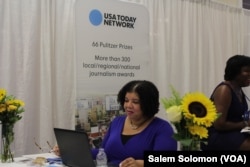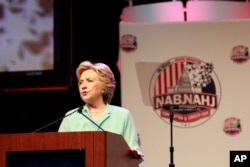A string of deadly encounters in the past two years between police and African-Americans have made headlines, prompting angry protests and forcing many Americans to confront race relations.
Names of victims, including Michael Brown, Sandra Bland and Eric Garner, have become rallying cries for protesters such as the nationwide movement Black Lives Matter.
Amid the turmoil, African-American journalists have had a difficult juggling act. They have worked to cover the stories while grappling with their own feelings about racial injustice.
At the annual convention for the National Association of Black Journalists and the National Association of Hispanic Journalists in Washington, reporters shared their feelings about covering news events that resonated with them personally.
Conway Gittens, a reporter with Reuters Television, said he pushed for his organization to cover the case of Sandra Bland, an African-American woman who died in police custody in a Texas jail cell in 2015. Her death ignited a firestorm of protests from people who disputed the official account that her death was a suicide.
'It did weigh on me'
Gittens and colleagues had begun covering the case prior to her death when a video surfaced of her in a physical altercation with police.
After covering Bland's story and her funeral, "it did weigh on me because it was heavy to tell that story and for it to end that way,” he said. “When I first pitched that story to my editor, I never thought it was going to end with her being dead so it had an emotional toll on me at the end.”
That type of emotional investment can make the job of a neutral reporter difficult.
“I would try to walk a balanced line,” Gittens said. “Number one, I am a professional whether I am black, white or Chinese. My goal is to tell the story and to tell the story accurately.
"But then also I bring to the table my culture," he said.
Gittens said it is all about remembering to present the facts so the reader or viewer can make up his or her own mind.
“I want the story to be told fairly and I want the story to be told in a way the viewer [can’t] say, ‘He's just doing that because he's black.’ And so that means using the tried-and-true principles of journalism. I stick to them regardless of my color. And tell the story accurately and tell it well and that way the bias is not there," he said.
However, Nichelle Smith, features editor at USA Today Network National News Desk, said that everyone brings biases when covering stories.
“The notion that we have been indoctrinated with as journalists in terms of never bringing bias and always being objective, I think that's rather mythical in a way,” Smith said. “Everybody brings biases.”
She said the fact that there is a constant effort among newsrooms to recruit and hire more people of color acknowledges this fact. It shows that people from different backgrounds will view news and report on news differently.
“Some newsrooms are going about reporting on situations like these, they have black people there whose talents they can tap, but we’re not even part of the conversation," Smith said. "So that only adds to the anxiety about the situation at hand and I think it takes away from coverage."
Difficult journey
Farron Salley, a reporter with FOX 23 News in Tulsa, Oklahoma, confronted racial issues when she covered the shooting of an unarmed black man by a reserve deputy in Tulsa.
While subduing the man, the deputy thought he had grabbed his Taser, but he accidentally shot him with a pistol.
The deputy "was not even supposed to be on that case, he was not a full-time sheriff deputy and it led to the sheriff resigning and it just led to some tough questions,” Salley said.
Such questions, when asked by media and the public, can only help America move forward, she said.
“I believe in our country so much and I believe that the news is helping to make our country a better place,” Salley said. “And I know that there are things that they may see or hear about that are going on right now are horrific and honestly as an American citizen it is kind of scary. You don’t know where the next shooting is going to be or the next bombing or just anything crazy is going to happen.”
But Salley emphasized that this turmoil is leading the U.S. to a better place, even if the journey is a difficult one.
“When I look back at what happened in the '60s, we ended up passing laws that gave black people the right to vote. So when I look at what’s going on now, we are in the midst of our own little revolution,” she said. “But it’s something that’s happening that’s reinvigorating people. And at the end, at least discussions like what we are having right now, I know it’s going to make us better.”
Clinton discussion
Meanwhile, Democratic presidential nominee Hillary Clinton on Friday held a question-and-answer session with the journalists. It marked the first time she has talked about the challenges she would face leading a country where most Americans don't trust her and how that political problem could impact her future administration.
Clinton also attempted to "clarify and explain" comments she made last week that FBI Director James Comey had said her answers about her email practices were "truthful."
She has claimed she never sent or received anything marked classified on a private email server she used while secretary of state. After an FBI investigation, Comey said seven e-mail chains dealt with matters that were "classified at the Top Secret/Special Access Program level when they were sent and received."
"I may have short-circuited and for that I will try to clarify,'' Clinton said, adding that Comey was speaking solely about her responses in a closed-door FBI interview and not her public comments on the issue, which have included inconsistencies.
The NABJ-NAHJ convention ends Sunday.







